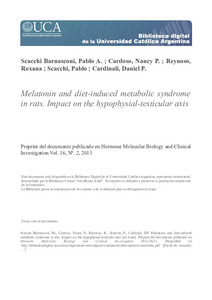Please use this identifier to cite or link to this item:
https://repositorio.uca.edu.ar/handle/123456789/1644| Título: | Melatonin and diet-induced metabolic syndrome in rats. Impact on the hypophysial-testicular axis | Autor: | Scacchi Bernasconi, Pablo A. Cardoso, Nancy P. Reynoso, Roxana Scacchi, Pablo Cardinali, Daniel Pedro |
Palabras clave: | MELATONINA; SINDROME METABOLICO; FRUCTOSA; DIETA; LH; FSH; HIPERTENSION; DISLIPIDEMIAS; TOLERANCIA A LA GLUCOSA; ACIDO URICO | Fecha de publicación: | 2013 | Editorial: | De Gruyter | Cita: | Scacchi Barnasconi, P. A. Melatonin and diet-induced metabolic syndrome in rats : impact on the hypophysial-testicular axis [en línea]. Preprint del documento publicado en Hormone Molecular Biology and Clinical Investigation. 2013, 16 (2). doi:10.1515/hmbci-2013-0005. Disponible en: https://repositorio.uca.edu.ar/handle/123456789/1644 | Resumen: | Abstract: Combinations of fructose- and fat-rich diets in experimental animals can model the human metabolic syndrome (MS). In rats the increase in blood pressure (BP) after diet manipulation is sex-related and highly dependent on testosterone secretion. However, the extent of diet impact on rodent hypophysial-testicular axis remains undefined. In the present study rats drinking a 10% fructose solution or fed a high fat (35%) diet for 10 weeks had higher plasma levels of luteinizing hormone (LH) and lower plasma levels of testosterone, with absence of significant changes in circulating follicle-stimulating hormone (FSH) or in weight of most reproductive organs. Diet manipulation brought about a significant increase in body weight, systolic BP, area under the curve (AUC) of glycemia after an i.p. glucose tolerance test (IPGTT) and plasma lowdensity lipoprotein-cholesterol, cholesterol, triglycerides and uric acid levels. The concomitant administration of melatonin (25 μg/mL of drinking water) normalized the abnormally high LH levels but did not affect the inhibited testosterone secretion found in fructose- or high fat-fed rats. Rather melatonin per se inhibited testosterone secretion. Melatonin significantly blunted the body weight and systolic BP increase, the increase in the AUC of glycemia after an IPGTT and the changes in circulating lipid profile and uric acid found in both MS models. The results are compatible with a primary inhibition of testicular function in the diet-induced MS in rats and with the partial effectiveness of melatonin to counteract the metabolic but not the testicular sequels of rodent MS | URI: | https://repositorio.uca.edu.ar/handle/123456789/1644 | ISSN: | 1868-1883 (impreso) 1868-1891 (online) |
Disciplina: | MEDICINA | DOI: | 10.1515/hmbci-2013-0005 | Derechos: | Acceso Abierto | Fuente: | Preprint del documento publicado en Hormone molecular biology and clinical investigation 16(2), 2013 |
| Appears in Collections: | Artículos |
Files in This Item:
| File | Description | Size | Format | |
|---|---|---|---|---|
| melatonin-diet-induced-metabolic.pdf | 572,52 kB | Adobe PDF |  View/Open |
Page view(s)
156
checked on Apr 30, 2024
Download(s)
240
checked on Apr 30, 2024
Google ScholarTM
Check
Altmetric
Altmetric
This item is licensed under a Creative Commons License

